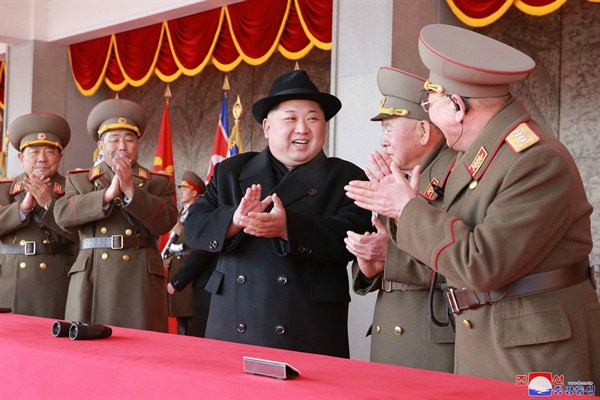Ahead of a potential meeting between U.S. President Donald Trump and North Korean leader Kim Jong Un, recent statements from Washington and Pyongyang have veered wildly in tone and substance, moving from conciliatory to combative and back again. Yet the latest head-spinning developments follow several months of seemingly steady progress toward a potential breakthrough on the Korean Peninsula. The following 10 WPR articles trace that remarkable shift and also describe the risks for both sides going forward.
The following 10 articles are free for nonsubscribers until June 14.
Making Nice
Kim’s Offer of Talks Provides an Opening, but Capitalizing on It Won’t Be Easy
In a stunning development back in March, Kim Jong Un reportedly told visiting South Korean envoys that he was willing to negotiate with the U.S. about abandoning his nuclear weapons. As Steven Metz noted in this column, the news suggested there could be an opportunity to move past longstanding enmity between Pyongyang and Washington. But massive obstacles stood in the way.
How the Trump-Kim Summit Will Break the Rules of Peacemaking
Richard Gowan wrote last month that peacemaking is generally a low-key business. Professional mediators approach international standoffs in a slow, deliberate manner, avoiding any sudden moves or big news stories that could throw everything off-track. Donald Trump and Kim Jong Un, however, seem to be playing by different rules.
Can North Korea Restore America’s Status as Global Peacemaker?
Efforts to resolve the crises in Syria and on the Korean Peninsula are moving at remarkably different speeds, in no small part because of the Trump administration’s divergent approaches to them. As Richard Gowan pointed out in this column, Trump has treaded cautiously on Syria while responding to apparent overtures from Kim Jong Un with a level of enthusiasm that risks making him look naive.
The Delicate Dance Toward Korean Peace May Have Just Begun
The meeting in April between Kim Jong Un and South Korean President Moon Jae-in was the first inter-Korean summit in over a decade and only the third since the nation was divided after World War II. It was also, much like the Winter Olympics, long on symbolism and short on substance. Nevertheless, as Charles Armstrong wrote after the summit, that symbolism was extraordinary.
Playing Hardball
A ‘Bloody Nose’ Strike on North Korea Is Certainly Risky. Is It Crazy?
Back in February, the Trump administration was reportedly mulling a limited, preventive military strike against North Korea—what was referred to as the “bloody nose” strategy. The idea attracted vociferous opposition. Nevertheless, Steven Metz described the peculiar, even paradoxical, logic of deterrence underpinning it.
How the Fate of the Iran Deal Could Affect Talks With North Korea
Ever since Donald Trump took office, his administration has been heavily focused on Iran and North Korea—challenges that, while very different, are hardly unrelated. In this column, Ellen Laipson described how withdrawing from the 2015 Iran nuclear deal would shape North Korea’s approach to negotiating a nuclear agreement of its own.
If the U.S.-South Korea Alliance Goes, Does America’s Strategy in Asia Go With It?
Donald Trump has repeatedly threatened to go to war with North Korea. Why, then, does Washington’s 65-year-old security alliance with South Korea look shakier today than at any time since its inception? Earlier this month, Steven Metz argued that the U.S.-South Korea relationship has emerged as a bellwether of the future of the wider Asia-Pacific region.
America Is Not Kim Jong Un’s Main Concern
What looked like growing momentum toward a detente between North Korea and its adversaries suddenly hit a snag earlier this month when Kim Jong Un first threatened to call off a potential meeting with Donald Trump. Steven Metz explained at the time that while the apparent reversal was perplexing to Washington, it made good sense in light of Kim’s need to cope with internal threats.

